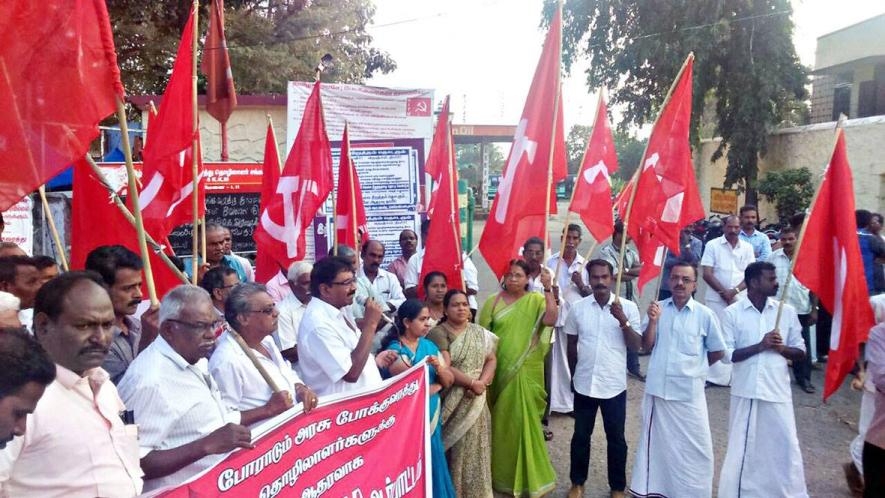TNSTC Workers to Continue the Strike Till their Demands are Met

Amidst the uncertainty looming in public transport sectors across the country, Tamil Nadu State Transport Corporation (TNSTC) workers entered eighth day of the indefinite strike on Thursday, January 11, 2018, demanding wage revision.
Although, Chief Minister E Palaniswamy said in state assembly that the government was ready to hike the wages by 2.44 times, the workers who demand 2.57 times hike, a minimum wage of Rs. 19500 among others, continued their strike.They staged a dharna with family members including children outside the regional offices of the transport corporation across the state on Wednesday.
The members of Communist Party of India (Marxist) also demonstrated in different areas across Tamil Nadu on Wednesday in solidarity with the ongoing struggle of transport workers.
Urging that the CM should come to the negotiation table to resolve the hardships of the workers, as many as 17 trade unions, led by Centre of Indian Trade Union (CITU) and Labour Progressive Federation (LPF) said that they will continue their protest until the government agrees on the demands of workers.
On the other hand, the government, which is hesitant to meet the demands of the transport workers, tabled a bill in the assembly to increase the salaries of MLAs by nearly 100 percent.
The hardship of TNSTC workers is not an isolated case. The on-going protest is the part of a larger struggle in the public transportation sector across the country. During the third week of October 2017, the Maharashtra state road transport corporation workers had staged protests, demanding the minimum wages as per the 7th pay commission’s scale.
In the third week of December 2017, Rajasthan State Roadways Transportation Corporation workers had staged a two-day dharna across the state demanding pending payment of bonus and ex gratia amounts due for the financial year 2016-17.
Even when the clouds of crisis prevail in this sector, the BJP-led NDA government is all set to implement the Motor Vehicles (Amendment) Bill 2016, which is currently under consideration of the select committee of Rajya Sabha. Though the government wants to introduce the bill, the road transport workers and unions have been demanding that the bill should be replaced since it paves the way for privatisation.
The Bill amends the Motor Vehicles Act of 1988 to address issues such as third-party insurance, regulation of taxi aggregators, and road safety.
On the stepwise implementation of corporatisation of public sector transportation through the aggregated platforms, KK Divakaran, general secretary of All India Road Transport Workers’ Federation (AIRTWF), said: “as a first step, a new aggregated umbrella platform was formed in the taxi sector like Uber and Ola. Though it is illegal as per the motor vehicle act, the government allowed them which resulted in the job loss of lakhs of workers in this sector.”
The umbrella platforms are spreading into more sectors like goods transportation, Divakaran added.
The legalisation of these aggregated will affect the state transport corporations which are operating effectively and lakhs of workers will be left unemployed, Divakaran noticed.
“Presently, about 20% of the transport vehicles are run by state transport undertakings. The government wants to denationalise all these roots and hand them over to corporates. In the name of rationalisation, they are introducing privatisation in the sector,” said Divakaran while talking to newsclick.
Though union finance minister Arun Jaitley announced that the government had decided to abolish permit raj, it is ultimately helping the corporates, Divakaran observed.
“In the name of abolishing permit, they are introducing license. If so, a number of operators will come up and the corporates also will enter into this which will ultimately lead to the closure of state transport undertakings.”
The license allows the private operators across the country to operate intra and inter-state bus services on any route they find profitable. As per the current rules, private bus operators require permits from the state government for every route they want to operate on. "This leads to the destruction of the public transportation sector", the AIRTWF general secretary said.
All these policies of the Centre present a tough challenge to state road transport undertakings which are in crisis now.
Get the latest reports & analysis with people's perspective on Protests, movements & deep analytical videos, discussions of the current affairs in your Telegram app. Subscribe to NewsClick's Telegram channel & get Real-Time updates on stories, as they get published on our website.























